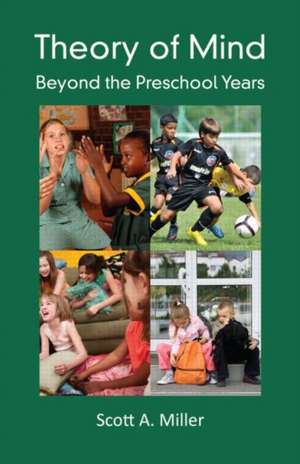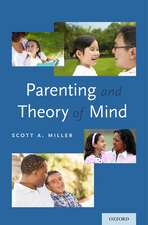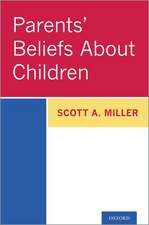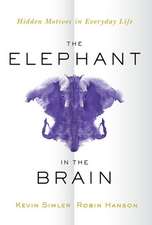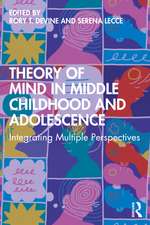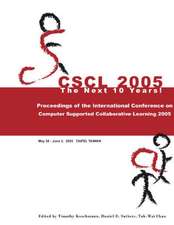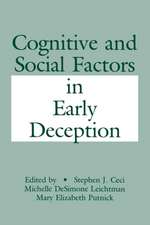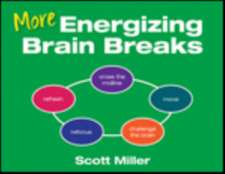Theory of Mind: Beyond the Preschool Years
Autor Scott A. Milleren Limba Engleză Paperback – 6 apr 2012
Examining the later developments of TOM gives readers a greater understanding of:
- Developments that occur after the age of 5.
- Individual differences in rate of development and atypical development and the effects of those differences.
- The differences in rate of mastery which become more marked, and therefore more informative, with increased age.
- What it means to have a “good theory of mind.”
- The differences between first- and second- order theory of mind development in preschoolers, older children, adolescents, and adults.
- The range of beliefs available to children at various ages, providing a fuller picture of what is meant by “understanding of belief.”
Ideal as a supplement in graduate or advanced undergraduate courses in theory of mind, cognitive development, or social development taught in psychology and education. Veteran researchers will also appreciate this book‘s unique synthesis of this critical research.
| Toate formatele și edițiile | Preț | Express |
|---|---|---|
| Paperback (1) | 445.56 lei 43-57 zile | |
| Taylor & Francis – 6 apr 2012 | 445.56 lei 43-57 zile | |
| Hardback (1) | 767.74 lei 43-57 zile | |
| Taylor & Francis – 18 apr 2012 | 767.74 lei 43-57 zile |
Preț: 445.56 lei
Nou
Puncte Express: 668
Preț estimativ în valută:
85.26€ • 89.25$ • 70.55£
85.26€ • 89.25$ • 70.55£
Carte tipărită la comandă
Livrare economică 07-21 aprilie
Preluare comenzi: 021 569.72.76
Specificații
ISBN-13: 9781848729285
ISBN-10: 1848729286
Pagini: 264
Dimensiuni: 152 x 229 x 15 mm
Greutate: 0.36 kg
Ediția:New.
Editura: Taylor & Francis
Colecția Psychology Press
Locul publicării:Oxford, United Kingdom
ISBN-10: 1848729286
Pagini: 264
Dimensiuni: 152 x 229 x 15 mm
Greutate: 0.36 kg
Ediția:New.
Editura: Taylor & Francis
Colecția Psychology Press
Locul publicării:Oxford, United Kingdom
Cuprins
1. Theory of Mind. 2. First-Order Developments. 3. Second-Order False Belief. 4. Other Higher-Order Developments: Part 1. 5. Other Higher-Order Developments: Part 2. 6. Consequences of Second-Order Understanding. 7. Historical Connections: What Did We Know Before Theory of Mind? 8. Conclusions.
Recenzii
"There are very fewworks that provide the insight Miller does into specific higher-order theory of mind developments. His book will help novices develop their knowledge of theory of mind and provide a basis for experts to further discuss what constitutes theory of mind and higher-order developments. One very important aspect of his book is that it provides a reference framework for understanding theory of mind research methods and tasks. Miller's book provides the current state of the construct and an important framework for continued discussion and research." -Pina Tarricone, School of Education, Edith Cowan University, Journal of Applied Developmental Psychology
"The strength of this volume is in Miller’s synthesis of existing research. He reviews evidence from a remarkably broad set of topics and connects that evidence to the developing ToM. … In addition, there are gems of methodological wisdom along the way. ... Appropriate not only for researchers and theorists in the field of ToM and cognitive development but also for nonexperts and generalists who might appreciate the book’s intertwined developmental themes. For graduate students and, perhaps, advanced undergraduates, this book provides much to consider." - Marie T. Balaban, Eastern Oregon University, USA, in PsycCRITIQUES
“A timely volume addressing an important neglected area. ...The writing is clear and interesting. ... It will … be of interest to researchers in the area of cognitive development … [and] to clinicians, especially those in the field of autism. ...The book could be used as supplementary reading for graduate (and advanced undergraduate) students.“ - Janet Wilde Astington, University of Toronto, Canada
“The book serves a real purpose, uniting a popular new research tradition with older and parallel traditions. … The scholarship is very good. … It would make useful reading for advanced undergraduates. ... It should also have a market among researchers interested in theory of mind. … The book fills a gap in the literature.” - Martin Doherty, University of Stirling, Scotland
“This project will contribute substantially to the study of cognitive development. ... The author … will be widely cited for years by individuals interested in later theory of mind developments. … The writing style is superb. … Advanced undergraduates … would find the book useful.” - Derek Montgomery, Bradley University, USA
“The author is an excellent writer. He presents information clearly and persuasively. ... By providing more detailed coverage of theory of mind in the years past preschool ... the author will fill-in a significant gap in the literature.“ - John D. Bonvillian, University of Virginia, USA
“The writing is engaging from the start. … I will recommend it to colleagues teaching graduate level courses on cognitive development and will consider it for my own undergraduate course. ... This book will have wide appeal to developmental psychologists. The subject is timely, the coverage thorough and accessible.“ - Eric Phillip Charles, Pennsylvania State University, Altoona, USA
"The strength of this volume is in Miller’s synthesis of existing research. He reviews evidence from a remarkably broad set of topics and connects that evidence to the developing ToM. … In addition, there are gems of methodological wisdom along the way. ... Appropriate not only for researchers and theorists in the field of ToM and cognitive development but also for nonexperts and generalists who might appreciate the book’s intertwined developmental themes. For graduate students and, perhaps, advanced undergraduates, this book provides much to consider." - Marie T. Balaban, Eastern Oregon University, USA, in PsycCRITIQUES
“A timely volume addressing an important neglected area. ...The writing is clear and interesting. ... It will … be of interest to researchers in the area of cognitive development … [and] to clinicians, especially those in the field of autism. ...The book could be used as supplementary reading for graduate (and advanced undergraduate) students.“ - Janet Wilde Astington, University of Toronto, Canada
“The book serves a real purpose, uniting a popular new research tradition with older and parallel traditions. … The scholarship is very good. … It would make useful reading for advanced undergraduates. ... It should also have a market among researchers interested in theory of mind. … The book fills a gap in the literature.” - Martin Doherty, University of Stirling, Scotland
“This project will contribute substantially to the study of cognitive development. ... The author … will be widely cited for years by individuals interested in later theory of mind developments. … The writing style is superb. … Advanced undergraduates … would find the book useful.” - Derek Montgomery, Bradley University, USA
“The author is an excellent writer. He presents information clearly and persuasively. ... By providing more detailed coverage of theory of mind in the years past preschool ... the author will fill-in a significant gap in the literature.“ - John D. Bonvillian, University of Virginia, USA
“The writing is engaging from the start. … I will recommend it to colleagues teaching graduate level courses on cognitive development and will consider it for my own undergraduate course. ... This book will have wide appeal to developmental psychologists. The subject is timely, the coverage thorough and accessible.“ - Eric Phillip Charles, Pennsylvania State University, Altoona, USA
